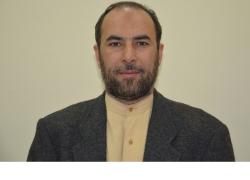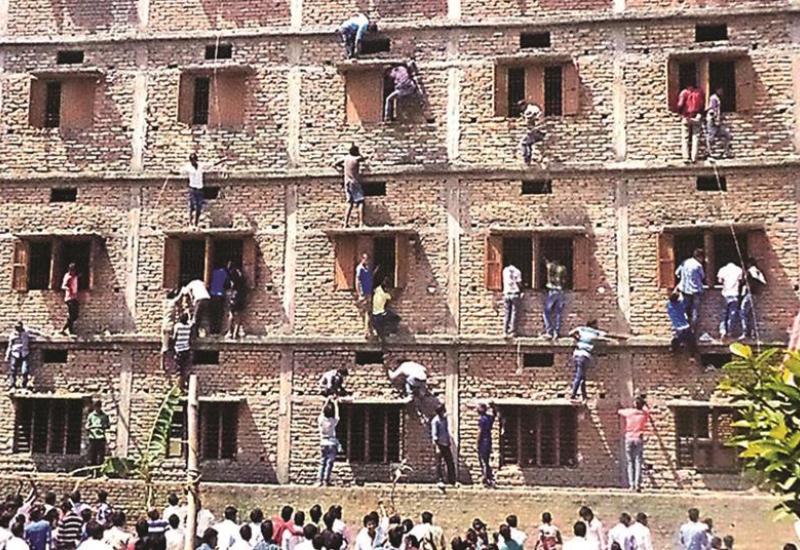How the students cheat in exams in a smart way and how to deal with it in a pragmatic manner? -10 important lessons from KMU Examinations Regulations.
While making intelligent use of technological innovations, some brainy students always seek inventive ways to cheat in exams. However, the relevant authorities and examining bodies always keep a vigilant eye over it and define new strategies to deal with it. In a recent landmark decision, the Chinese government proclaimed cheating, a crime and the students who cheat during exams risk 07 years of jail imprisonment as a part of the government crackdown to tackle the menace with a heavy hand.
This blog post offers a synopsis of the Chinese government’s decision to deal with cheating in exams to reckon what the authorities in Pakistan can learn from the Chinese model. This post takes a leaf out of the Khyber Medical University Examinations Regulations to elucidate how this emerging university is dealing with the issue in a pragmatic manner. This post mainly covers the following important areas:
- An overview of the Chinese government’s decision to deal with cheating in exams
- What is considered cheating in exams?
- Why the students cheat in exams?
- What are the different ways in which the students cheat in exams?
- What the government authorities should proactively do- to deal with the menace of cheating in Pakistan?
- How the Khyber Medical University Peshawar is dealing with the menace of cheating in exams?
Chinese government’s decision to deal with cheating in exams
In China, the students could face a sentence of seven years of jail imprisonment on account of cheating during their university entrance exams as the government authorities attempt a crackdown on this pervasive problem for the highly competitive exams. Cheaters will, for the first time, face jail if convicted and shall be banned from taking other national-level entrance exams for three years under the law which has been amended so.
The university entrance exams, used to be a moment of high stress in China as millions of students compete for a limited number of slots in the universities. Authorities in China believe that the fear of a harsh punishment shall ensure transparency and fair play in the conduction of exams and shall restore credibility to the education system.
In this connection, the education ministry and China police have repeatedly urged the local governments to tackle the issue with an iron hand. A crackdown has been launched to get hold of the wireless devices used for cheating purposes and to cope with the problem of substitute exam-sitters on an urgent basis. Surveillance drones and metal detectors have already been put in place in the premises of exam centers to catch those bringing-in the illicit gadgets. However, it is for the first time that custodial sentences have been stipulated for anyone using underhand tactics to qualify their university entrance exam in China.
Though accusations of mass cheating in exams were rife in recent years in China, even organized syndicates of teachers and students were allegedly involved, the Chinese authorities have no option but to adopt stringent measures to deal with the curse of cheating in exams. It is widely believed that the authorities in China are serious about eliminating cheating and this enactment shall communicate a strong message to the students to avoid cheating in exams.
What is considered cheating in exams?
Cheating in examination means engaging in dishonest practices or breaching the regulations or violating the code of conduct during the course of the exam or concerning the exam which may include but not limited to acquiring or attempting to acquire, possessing or distributing exam-related material or information without approval. It also includes permitting another person to attend the exam on behalf of another student as an impersonator. However, there are numerous other distinct ways and means the students attempt to cheat in exams.
Why the students cheat in exams?
Many students cheat because they feel scared to be disappointed by the exam result. This phenomenon is more often mixed with existing social pressures of family, peers and relatives. The unrealistic expectations on the part of parents and students to excel can be overwhelming. Based on the students’ feedback, it was found that most of them believe that they cheat in such a tactful and incognito manner that it would not be possible to be perceived, detected and caught by the invigilating staff. Others still believe that how much stringent, the preventive and punitive measures were being enforced by the examining body, they still feel that without double-dealing they wouldn’t be able to get through.
Some students assume that without using unfair means, it would not be possible for them to qualify any exam. Some students are yet to be good performers but they opt for some sort of chicanery believing it would help them pass the exam with flying colours. And some aspire for exceptional grades which they feel wouldn’t be possible sans treachery. If these misperceptions are dumped up, there is a strong possibility that many students evade hanky-panky during the course of exams.
What are the different ways in which the students cheat in exams?
The students always try to find some distinctive ways to cheat in their exams. With the intelligent use of high-tech gadgets, they believe they would be smart enough to beat the system and cheat without being noticed. The tactics used by the students for the purpose vary with the changing times. However, some of the traditional modes of cheating are listed here:
Traditional ways of cheating in exams
- Communicating in any way during the exam with any other student or any person who is not an exam invigilator inside or outside the exam center
- Giving or accepting assistance from a fellow student or any person who is not an exam invigilator whilst in the exam venue
- Permitting another person to attend the exam on behalf of another student
- Writing cheating material on the body parts, arms, palms, legs or nails etc.
- Writing cheating material on the water bottle
- Writing cheating material on the shirt
- Writing cheating material on the Roll No. slip or admitting card or pen
- Reading, copying from or otherwise using another student’s work in an exam or knowingly allowing a student to do so
- Possessing, referring to or having access to any material or device containing information directly or indirectly related to the subject matter under exam other than that are explicitly allowed
- Acquiring, or attempting to acquire, possessing or distributing exam materials or information without approval
In the contemporary world, thanks to innovative modern technology devices, the students continuously seek a more sophisticated, ingenious and smart ways of cheating. Some of the widely reported smart ways used by the students for cheating are listed here:
Smart ways of cheating in exams
- Using high-tech devices such as wristwatches, smartwatches, spy cams, special glasses, spy earpieces, Magic Calculator, Bluetooth pen, and invisible watches
- Using cell phones for sharing question papers and receiving answers
- Using auto coding softwares
- Using other external devices
What the government authorities should do proactively to deal with the menace of cheating in Pakistan?
With the help of more sophisticated devices and advanced gadgets, the temptation to go for deceit in exams has become so pervasive and deep-rooted that the concerned authorities shall always be required to update their preventive mechanism, punitive means and enforcement strategies.
I believe that the student should be educated and sensitized about the repercussions of cheating. The examining body needs to educate the students about it. However, it is the prime responsibility of the students to familiarize themselves with the prevailing rules, exam regulations and code of conduct that apply to the use of cheating material in exams and the repercussions of using unfear-means during exams.
Taking a leaf out of the Chinese approach, the authorities in Pakistan should also enforce such an enactment in the country to deter the students to avoid cheating in exams.
How the Khyber Medical University Peshawar is dealing with the menace of cheating in exams?
Cheating in exams may have serious repercussions. Taking cognizance of the situation, the KMU authorities take a very serious note of mal-practices used in exams. Students who cheat may be excluded from the university’s role for up to three years and being implemented very rigorously. This means that the student loses all access to the university and may be denied the right to take exam at other universities and colleges during the same period.
To deal with the menace, the KMU Syndicate upon recommendations of the Academic Council very recently approved a set of new regulations which attracted the attention. The students need to be sensitized about it so that they avoid using unfear-means in their future exams. A summary of the nature and mode of cheating/ unfair-means used by the candidates and the proposed list of penalties, these regulations encompass are listed here:
- The act of repeatedly talking in the exam hall with other fellow candidates during the course of the exam/paper.
In this case, the proposed penalty is quite novel. The candidate shall arrange plantation of 15 plants in his/her own institute/college or any other constituent/ affiliated college of KMU and shall submit a certificate to this effect along with a picture of the same through the concerned Head of the Institute/ College.
- The act of misbehaviour with the invigilation staff in the examination hall.
In this case, the proposed penalty is that the candidate shall arrange donation of 05 bags of blood at a reputed blood donation center such as Fatimid Foundation, Hamza Foundation, Regional Blood Centers, Hayatabad Medical Complex Peshawar, Khyber Teaching Hospital, Leady Ready Hospital, Shaukat Khanum Hospital, Aga Khan Hospital etc. and shall submit a receipt/certificate to this effect through the concerned Head of the Institute/College.
- The act of possessing cheating material by the candidate
In this case, the candidate shall be fined for a suitable amount commensurate with the cheating act and the material found with him/her.
- The act of using cheating material (copying from any paper, book or notes, or allowing any other candidate to copy his/her answer book).
In this case, the proposed penalty is the cancellation of the concerned paper of the candidate involved.
- The act of possessing a cell phone/smartwatch/blue tooth device or any such technology-based gadgets.
In this case, the candidate shall be penalized with the cancellation of the concerned paper and confiscation of the cell phone/ smartwatch/blue tooth device or gadgets by the examination department or the concerned gadget shall be returned provided that the candidate concerned pay a fine equivalent to the market value of the cell phone/gadget.
- The act of using a cell phone/smartwatch/blue tooth device or any such technology-based gadgets
In this case, the cheat shall be treated more harshly as the matter is getting more sensitive and shall be penalized with the cancellation of exam and confiscation of the cell phone/gadgets. In case the candidate presses hard, the gadget shall be returned and the candidate has to pay a fine equivalent to the market value of the cell phone/gadget.
- The act of using a cell phone/smartwatch/blue tooth device or any such technology-based gadget for cheating/sharing the question paper
In this case, the candidate may be penalized with the cancellation of the exam and shall face disqualification for a period of 03 years to appear in any exam of the university. Besides the confiscation of the cell phone/gadgets by the authorities shall be put in place provided that if the candidate is not sharing the password/pattern/PIN of the cell phone, then an additional penalty as mentioned at S. No. 2 above (which is the arrangement of donation of 05 bags of blood at a reputed blood donation centre) shall be imposed.
- Impersonation
In this case, the candidate shall be penalized with the cancellation of the exam and disqualification for 03 years to appear in any exam of the university (both the original candidate and impersonator). An FIR shall be lodged against the impersonator if he/she is not a student of the university’s constitute or affiliated college/ institute.
- Appearing in an exam based on fake academic credentials
In this case, the candidate shall be penalized with the cancellation of the exam and disqualification for a period of 03 years to appear in any exam of the university.
The way forward
The relevant examining boards, testing agencies and universities’ examination departments must use stringent measures to combat the menace of cheating in exams. Nevertheless, at times it becomes cumbersome for the examining bodies to enforce harsh penalties in letter and spirit due to numerous reason. Hence, the government should take the reins and come up with some rigorous and more stern enactments in line with the steps taken by the Chines government to deal with the issue.















